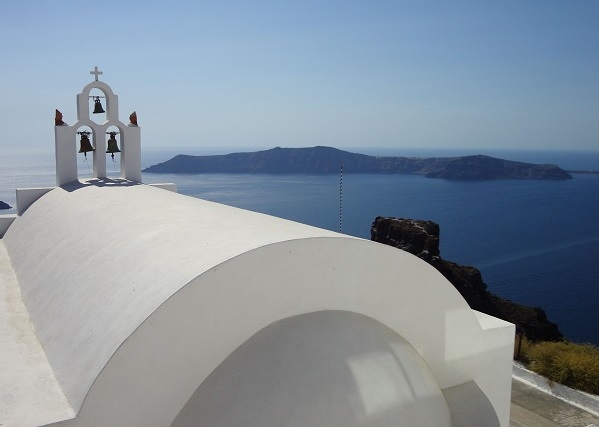
Join me for a celebration of Easter on my first trip through the Greek islands.
NOTE: I’ll resume my Virtual Italy Vacation posts next week with the Vatican Museum. This week, I’m revisiting memories of my first backpacking trip around Greece in 1981, including an Easter week stay at a remote village on the south coast of Crete. I have only a few photos remaining from that trip, so some here are from later trips and islands.
Leaving remote Loutro on a local ferry east, Jim (my partner at the time) and I enjoyed the deep blue seas and views of the rugged cliffs along the south coast of Crete. We disembarked at Chora Sfakion and were unable to compete with sudden hordes of young Germans on holiday scrambling for the bus out of town, so found a flat spot outside town to pitch our tent beside a small, abandoned chapel. We finally scored a spot on the crowded bus to Skaloti the next day, sharing space with chickens, packages, and an assortment of Cretans including a beautiful young woman with a profile from an ancient urn, a handsome Orthodox priest with the tall black hat, and the usual exuberant bus driver. This one was a big, burly, graying man who gestured out the open side window and shouted greetings to locals sitting outside village tavernas just feet from the dirt road.
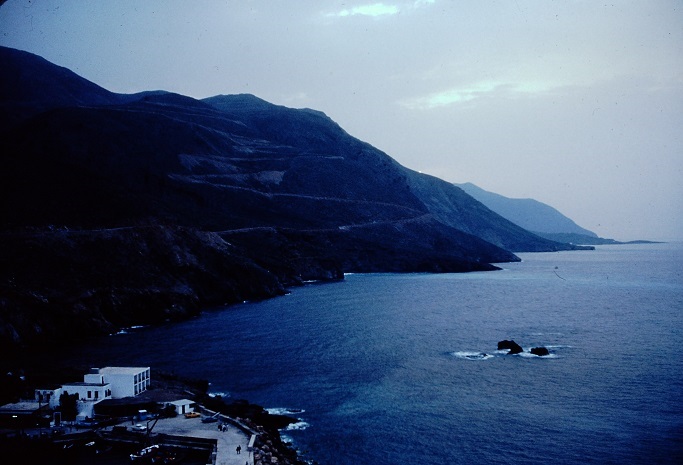
After a bus ride of many steep, tight turns above hair-raising drops into rocky ravines, we reached the end of the line at Skaloti, which boasted one dusty taverna/market and no accommodations. With only an hour before sunset, we contemplated the 15-kilometer hike eastward to the next bus connection, the village of Rodakino. Spreading our sleeping bags in a field, we wandered to the edge of the sea cliffs to soak in the vistas of stark pale stone and cobalt sea. Sitting on the steps of a deserted little whitewashed chapel, we enjoyed a softly rosy sunset. Letting time flow around me, feeling the lingering warmth of the stones soak into me, I sat listening to ancient whispers until blue dusk settled over the chapel.
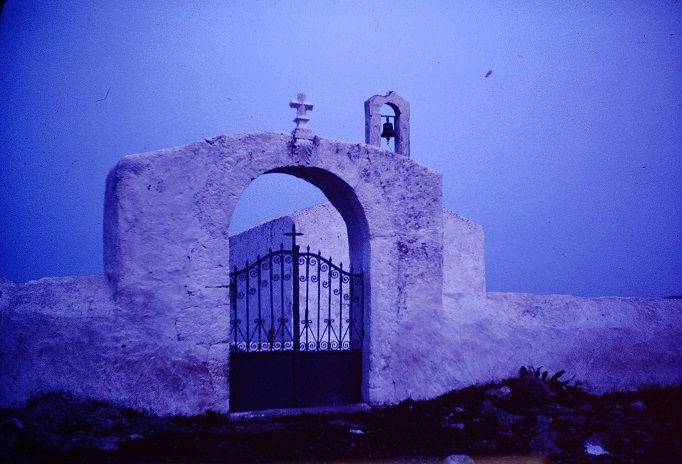
Back at our sleeping bags, we lay watching shooting stars streak across the distant constellations. The next morning dawned clear and hot as we hiked along the coast. I have a distinct memory of part of the trail clinging to a cliffside high above the sea, undercut with the rock brushing the top of my heavy pack and almost tipping me over the edge. We vowed to lighten our loads when we reached the next post office to send some things home. (Oh, for those strong young legs again!)
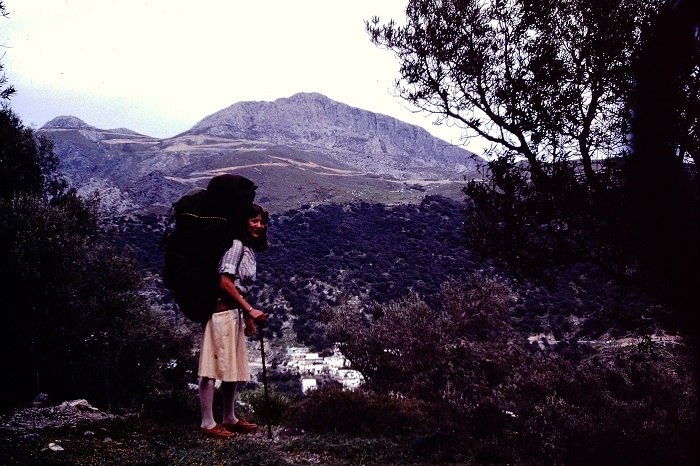
The last part of the hike returned us to the dirt road above the cliffs, where as we neared Ano Rodakino (Upper Rodakino village), we encountered a cheerful old shepherd with his goats. Josef, wizened and garrulous in Greek, seemed unfazed that I could catch only a word or two of his conversation, and we managed to communicate with gestures and much laughter. He chuckled as I scrambled over a rockfall blocking the road, and named me “Sara Kri Kri” for the wild Cretan goats. Here is my Josef character from my Greek islands pandemic/healer novel The Ariadne Connection:
One of Josef’s goats peered in through the verandah doorway of the taverna, black splotches over the pointed white face, fixing its satyr’s eye on Peter. Beard and wattles shaking, it trotted over to its master, butting him half off the chair.
“Young upstart! So you think you can take me?” Josef roared with laughter and kicked the goat away. Mavroyennis came flapping his apron to shoo it back outside.
The old man hauled himself out of his chair, straightening with a grimace, teetering like one of the island’s wind-twisted olive trees. “Josef Andrianopoulos will live forever. Still potent as the devil!” He drew himself up and gave Peter a fierce look. “Seize life, boy! Grip it like a sponge and wring it dry! Fear is for women and—” He broke off into a coughing fit.
Peter waited.
Josef smacked himself on the chest with a shaking hand and proclaimed, “I spit at death! I spit at God and the devil!” He hawked and spat on the floor as the owner threw his arms up. A brown hand gripped Peter’s shoulder as the old man leaned close to give him a significant look. “Toh tharos!” Courage. He seized his carved staff and shuffled out into the night, stiff but upright in his baggy tattered pants and cracked boots, calling for his dog, calling for his goats.
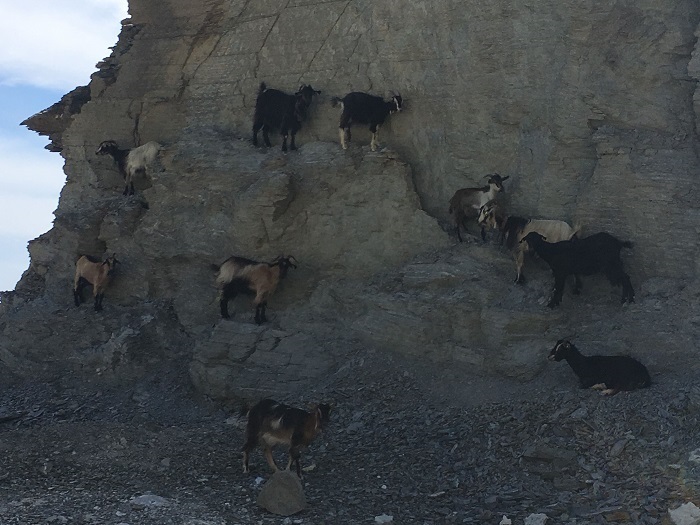
Jim, Josef, and I shared the greening beauty of this stretch of coastline, its steep ravines sparkling with rivulets from the mountain springs, clothed in fresh leaves and spectacular spring wildflowers. I drank in the broad stretches of wild poppies, both red and white, mixed with unnamed purple, yellow, and pink blossoms. Josef ushered us to the kafenion (a very basic café) in the village, and promised to see us later. I was glad I’d decided to wear a hiking skirt, as the inhabitants of these remote areas seemed more welcoming to modestly-dressed visitors than the scantily-clad vacationers we occasionally encountered.
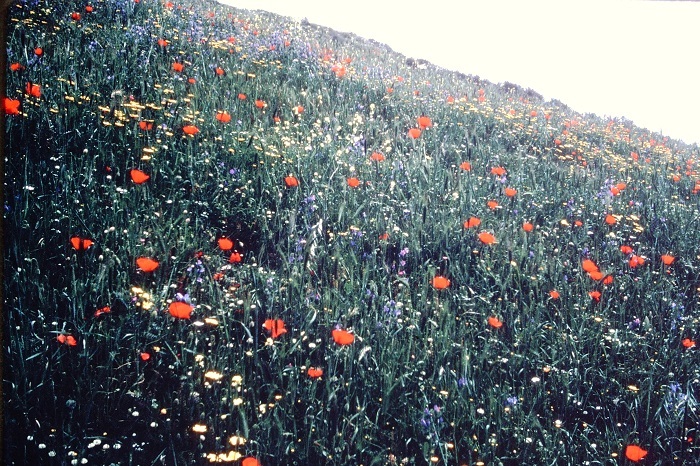
After lunch at the kafenion, we found the bus stop, only to learn that because of the upcoming Easter holiday, there would be no transportation out for several days. And the only road along the coast was blocked by a large pile of branches and wood scraps, in the process of being augmented by some boys dragging another branch over to the pile.
As we contemplated this mystery, a distinguished-looking Greek man dressed in nice slacks and a white shirt approached us to introduce himself and ask—in English!—if we needed help. Stelios Mamalakis, it turned out, had been born in the village but now resided in the United States and was visiting his family home here. He asked about our travels, and I explained my lifelong fascination with Greek history and intention to write a novel someday. At this news, Stelios lit up and began to explain the history of the village, pointing toward the church that his grandfather had built. He guided us to the only hotel in town (very basic, but shelter) and invited us to come to his house later for dinner. We had chanced upon the fabled Greek hospitality to the wandering stranger!
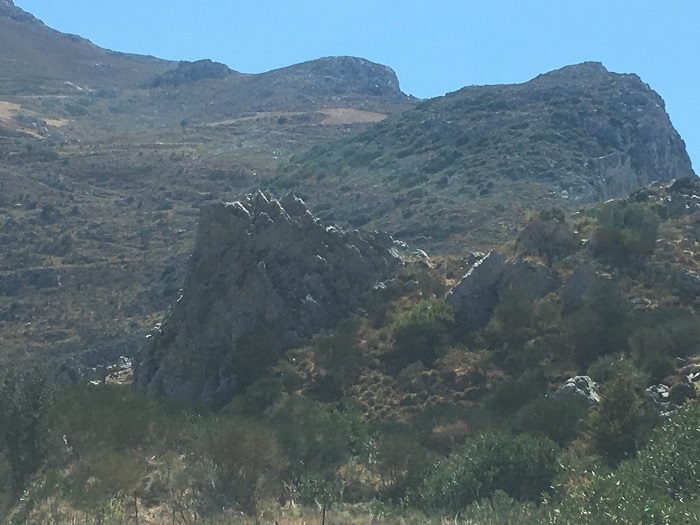
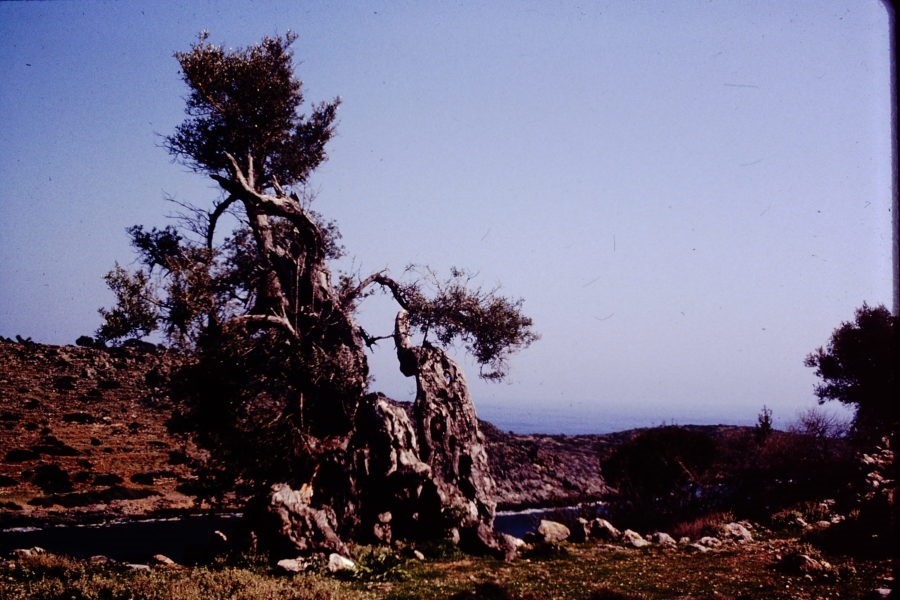
After camping on rocky ground for several days, even the sagging bed of the only hotel in Ano (Upper) Rodakino felt like luxury. Jim and I were enjoying sleeping in, waking slowly to sunlight sifting through the wooden-slatted shutters. Then we heard a loud clatter and voices raised in the courtyard below, cackling of chickens, and heavy footsteps pounding up the outside stairs. Our window shutter swung open, and a hen flew in with a frantic beating of wings and loose feathers flying. The landlord then burst through our door, diving under the bed after the scrabbling hen as we clutched the sheet higher over us. The landlord emerged gripping the hen and grinning, as Jim and I sat frozen, feathers drifting down around us. Then we all broke out into laughter.
There was no restaurant in the village, so we set up our camp stove and cooked the eggs Stelios Mamalakis had given us the night before. Then we set out to meet him for a hike and guided tour of this patch of coastline, which turned into a Socratic stroll as he delighted in educating us about local history and Greek culture. He was very proud of his father, who was a Resistance fighter against the brutal German invasion of World War II, and he echoed the irony of the Greek economy now relying heavily on tourism—a large percentage of visitors being Germans. As we scrambled down a steep, rocky goat trail, he chuckled and agreed with Josef that Sara Kri-Kri was a good name for me. I asked him for a translation of Jim’s Homeric epithet we’d earlier invented, “Dmitri the Hard,” but he told us that Greek wouldn’t preserve the multiple meanings of “hard.” Jim settled happily for “Demetrios Thenatos” (“the Powerful”) and Stelios noted, “He likes the sound of that, I think.”
Our guide showed us many hidden beauties in the rugged landscape: The tiny shoots of wild blue iris among the grass, clover, and poppies supported by a plentitude of year-round springs that kept this stretch of coast greener than we had seen farther to the west. Stelios led us over rocky bluffs and along goat tracks through the wicked, spiked bushes to his special beaches, one of them the ancient harbor of Apollonia. He gestured at the steep hills where giant boulders were strewn as if flung by a giant hand. Echoing my thoughts, he said, “Here I feel the rocks come alive. One day, my friend, this cliff will awake and stir, and we will see it is Apollo come back to visit the earth.”
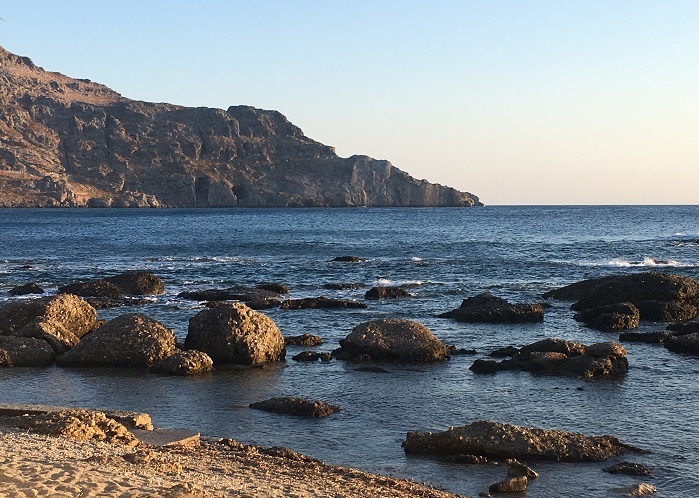
We headed back to Ano Rodakino, encountering again the pile of brush, branches, and scrap wood blocking the dirt roadway. When I asked Stelios why it was there, he winked and told us, “Good Friday is tomorrow. You will find out then.”
Good Friday in Rodakino:
Jim and I woke to a sky dark with ominous clouds, the weather exactly as Kyrios Mamalakis told it always was for this “day of sadness.” We went for a cold swim, explored the ruins of a Turkish fort at the nearby beach, then made our way back uphill beneath the bare mountain as forbidding as Golgotha. Only a white dove shone through the early dusk as it fluttered above.
We had been invited by Stelios Mamalakis to attend the special church service that night, so we cleaned up and dressed in our best, then walked through a ceaseless clamor of church bells to the village kafenion to meet him. He appeared dressed to the hilt in his city suit, looking very distinguished, and invited us into the kafenion for a drink. As we entered, everyone jumped up to offer him their seats. The room was the usual bare cement and stucco, with an assortment of mismatched wooden chairs, but noisily lively with talk and much gesturing. As we enjoyed the occasional translation, Josef Andrianopoulis—the garrulous shepherd we’d met while hiking in to Rodakino—joined the crowd, grinning as he greeted us. Jim bought him a drink and we all spilled a good-luck drop on the floor before toasting, “Chairete!” (Rejoice!) The local raki, like the powerful “white lightning” distilled by my Georgia cousins, should have been served in Pyrex glasses.
On the way out, Stelios pointed out a life-sized, straw-stuffed dummy seated outside the kafenion on a phallic wooden pole. “Poor Judas, destined for the flames tomorrow after the midnight service.” He gestured toward the mysterious bonfire in the middle of the road, and we finally understood.
As we approached the church, the bells became deafening, and Stelios must have seen me wince. He explained that Greeks loved to fill up the silence—with talk or whatever means handy, including passionate argument—to relieve loneliness. He himself hated to be alone.
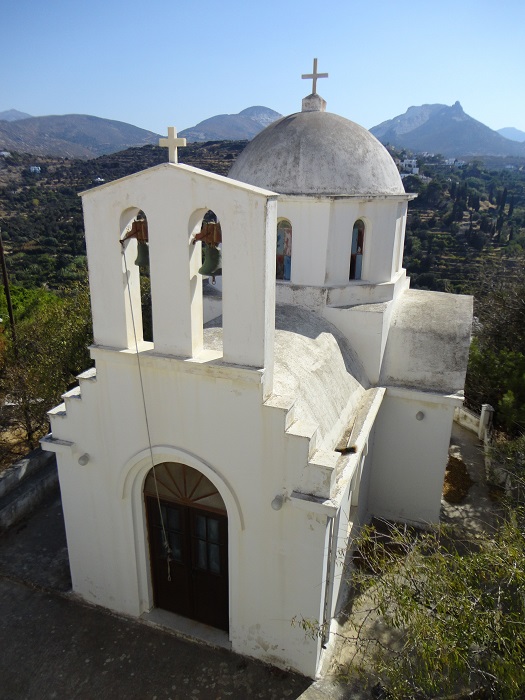
The church built by his priest father was a common “double-loaf” shape, with the bell arch at one end. Inside there were no pews, but only wooden booth-like seats around the walls. Flowers decked the walls between several stations with icons and crosses. For such a poor village, there was a surprising wealth of gold leaf and frescoes on one wall, specially commissioned by the elder Mamalakis from a monk of the Mt. Athos monastery. The floor was tiled elegantly with a black and white geometric pattern.
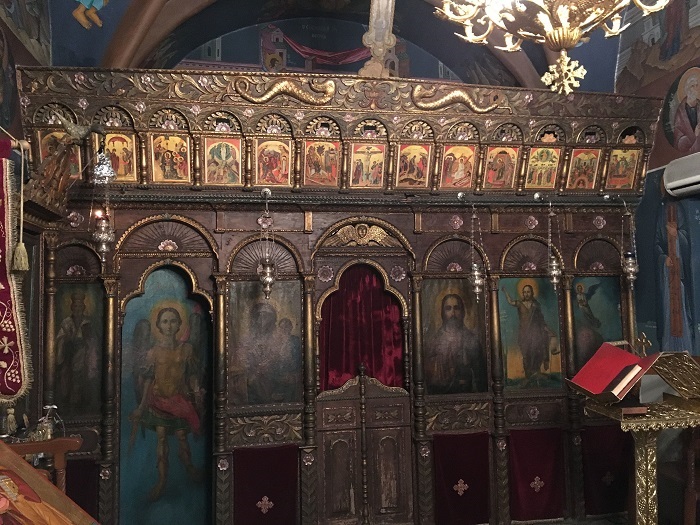
Working our way into the crowd, Jim and I bought candles and added them to the several flaming racks. Old, black-robed women in head scarves knelt repeatedly to kiss the floor, cross themselves in the Greek Orthodox manner, and move on to the next station to kiss the icons or the gold plaque depicting Christ crucified and a scene of the Last Supper. The priest with his tall black hat entered, swinging an incense censer. A group of children and youths began to chant and sing a service, and Stelios was then urged to provide the sung responses. His deep, resonant voice filled the church already echoing with a tumult of children running wild and shrieking.
Jim, who was raised Catholic, kept a pious composure as the service ran on into the second hour, and I began to fade under the continuing rounds of choking incense. Near the end, we were all sprinkled with holy water, and Jim whispered, “Now you’re a saint.”
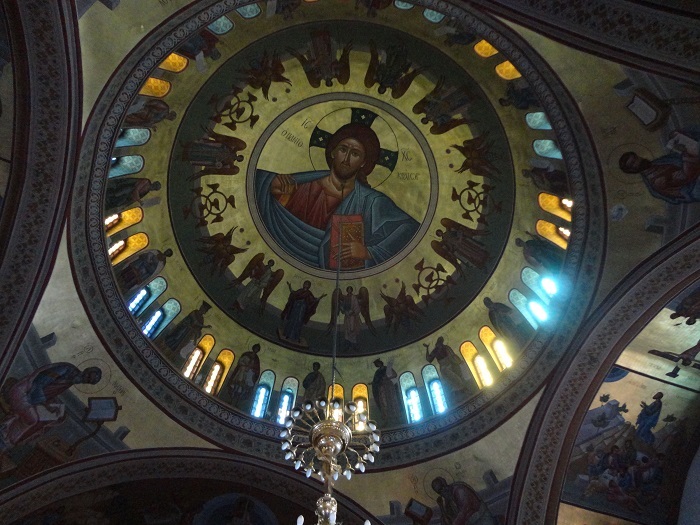
Finally, we all lit new candles and followed the flower-laden symbolic bier in a procession around the outside of the church a few times. We were told that if we made it around the church perimeter with our candles still lighted, we would have good luck for the year. (I seem to recall that my candle blew out in a breeze, but my journal doesn’t enlighten me in that regard.) Accompanied by more clamor of bells, we headed back to the hotel. As we settled into bed, a wild cloudburst broke overhead, drumming the earth.
And the next night, after another church service we decided to skip, the village men paraded old Judas on his stick up and down the road before installing him on top of the bonfire. At midnight, the flames ignited in a wild, fiery dance, and the sins of the year were consumed. Below is a passage from The Ariadne Connection, as an earthquake shakes the Cretan village where Peter and Ariadne find temporary refuge with her uncle Demetrios:
“That’s what this night is for. We give our sins to Judas!” Demetrios turned to wave an expansive arm over the crowd, shouting above the hubbub, “Time for the straw man to face the flames!”
A roar of approval, glasses raised all around. “To Judas, may he roast in Hell! May the fire burn hot!”
They threw the glasses smashing to the floor, then pushed toward the dark yard, surging around Peter as he swayed, rooted. One of the villagers tugged at his sleeve, urging him outside. “Come, Petro! Cast your sins onto the bonfire with us.”
He trailed along. His ears were really ringing now, deafening, or maybe it was only the crowd roaring as they ran ahead with torches. Flames streamed in the hot wind. The women and children were milling in the street too, singing in shrill voices. The raki burned sickening in his gut.
Another roar of laughter. Cheers. A knot of young men ran past, straw-stuffed Judas with his painted face bouncing on their shoulders, and Peter was pressed among the crowd in the street before the church, blinking bewildered at the huge pile of branches as the boys climbed to the top and impaled the figure on a stake, grinning cartoon face lolling out of the dark. Lightning flared. Thunder crashed. The crackle and dance of sparks answered it. Flames leapt up through the night.
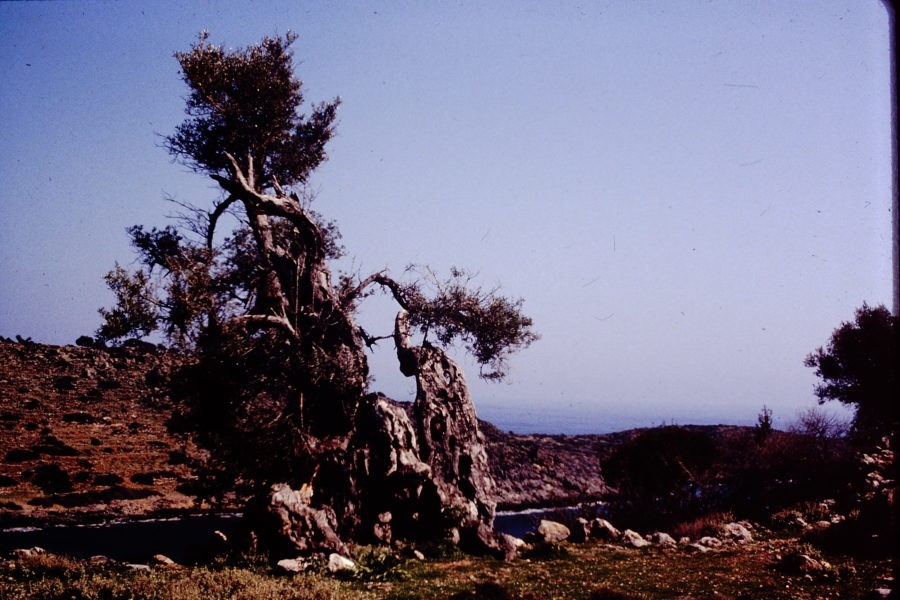
Thankfully, our Easter in Rodakino was not so cataclysmic. We woke to a bright, sunny morning, took a swim at the beach, and hiked uphill to take a nap in an olive grove, where some of the ancient trees were truly amazing. We then wandered the village, which seemed rather deserted. Finally we found an open restaurant in the lower village for an approximation of the traditional lamb dinner. When we climbed back to Upper Rodakino, we ran into Stelios Mamalakis, who asked, “Where have you been? We were invited to an Easter feast by my orchard caretaker.” Apparently it was quite a banquet of various kinds of lamb and sauces, and Stelios, as guest of honor, enjoyed the eyes and brain. I was sorry to miss the celebration, but relieved to avoid possibly sharing those delicacies.
The next day, we said farewell to Rodakino as Stelios offered final words of wisdom: “My friends, you are good people, so please help the world by living your lives in the best way you can!” Amen. And happy holidays to all, in whatever ways you celebrate, and wherever Spirit speaks to you.
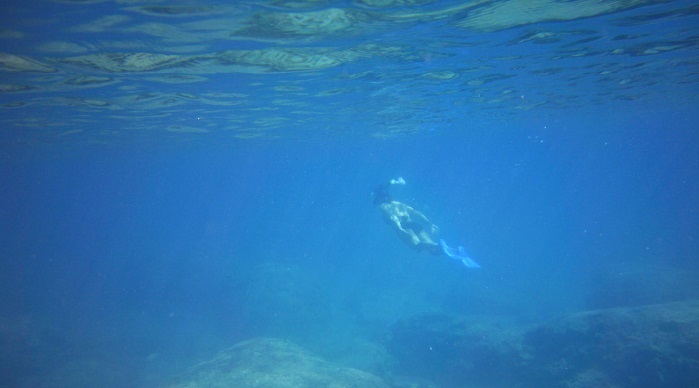
*****
You will find The Rambling Writer’s blog posts here every Saturday. Sara’s latest novel from Book View Cafe is available in print and ebook: The Ariadne Connection. It’s a near-future thriller set in the Greek islands. “Technology triggers a deadly new plague. Can a healer find the cure?” The novel has received the Chanticleer Global Thriller Grand Prize and the Cygnus Award for Speculative Fiction. Sara has recently returned from another research trip in Greece and is back at work on the sequel, The Ariadne Disconnect. Sign up for her quarterly email newsletter at www.sarastamey.com
